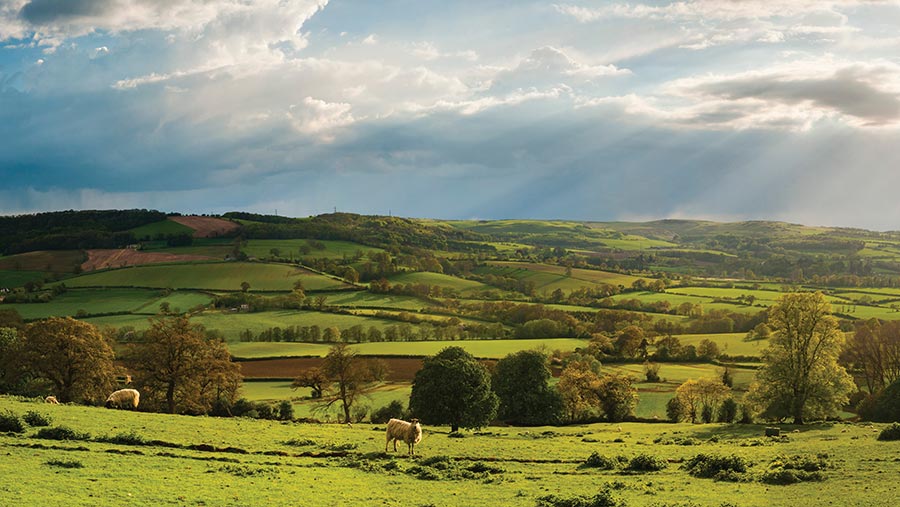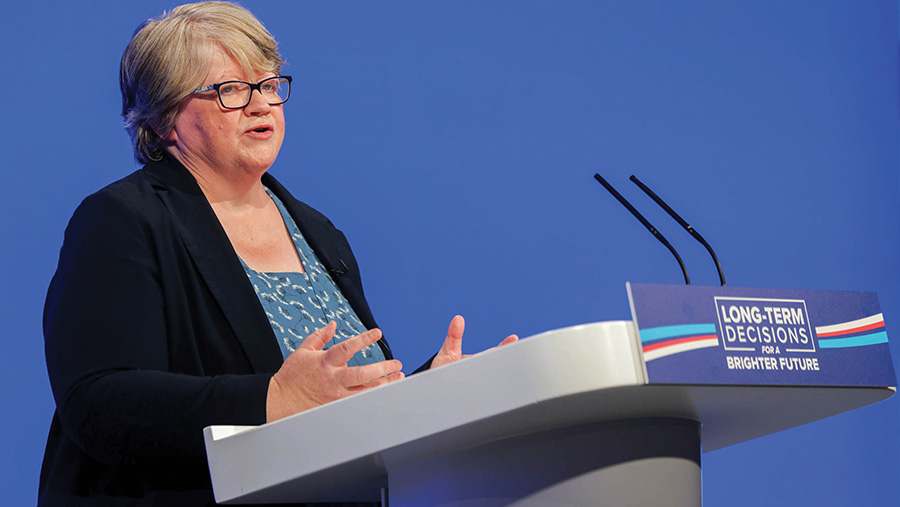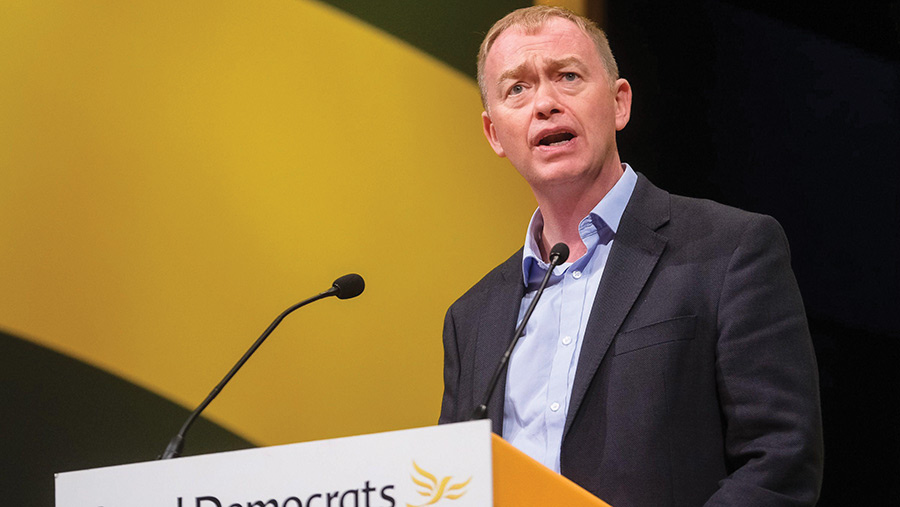Conference season: What did we learn about farming?
 © Matthew/Adobe Stock
© Matthew/Adobe Stock Food and farming has been more prominent this conference season than perhaps any other in living memory.
Brexit, the Covid pandemic and the war in Ukraine have put agriculture in the national spotlight in ways that couldn’t have been imagined pre-2016, and it would appear the political parties are sitting up and taking notice.
See also: Jacob Rees-Mogg’s pro-Aussie beef comments spark reaction
Josh Woolliscroft, head of policy and public affairs at plant science group CroplifeUK, was at the Liberal Democrat, Conservative and Labour events.
Food and farming
“The unifying factor across all three is that, for the first time, food and farming were way higher up on the agenda than they have been,” he said.
“Agriculture spokesman Tim Farron was very visible at the Liberal Democrat conference, as was the leader Ed Davey who spoke at the NFU reception.
“Compared with last year certainly, but previous years too, the front bench were much more prominent and available at the Tory Party conference,” Mr Woolliscroft added.
“There is a recognition that for Labour, the Conservatives and the Liberal Democrats, there are thousands of votes in the countryside that are up for grabs and they’re out to get them.”
Daniel Zeichner, Defra shadow farming minister, agreed, saying this year’s Labour conference in Liverpool – which was the largest since 1900 – had been “extraordinary”.
“I’ve been to conference for many years in many different guises. I’ve never been so busy as I am at this conference and I’ve been doing this brief for four years now,” he said.
The NFU also had a record-breaking year at the Labour event, with just under 1,000 Back British Farming pledges by MPs, prospective parliamentary candidates and local officials signed in the first two days – in comparison to 750 across the whole conference last year.
Tim Bonner, chief executive of the Countryside Alliance, said: “I’ve been doing these things for more than 20 years and I thought Liverpool was quite reminiscent of some of the pre-2010 Tory conferences, where David Cameron had made real changes to the party and the party was presenting itself in a different way.
“That’s clearly the effort Labour are trying to make.”
Points difference
Others at the conference went still further, saying the event had a “pre-1997 feel” to it – but Mr Woolliscroft was more cautious, pointing out Tony Blair had a lead of around 25 points at this time in the electoral cycle, which had dropped to 13 points by the election that he won with a landslide.
Today, Labour is registering a lead of between 15 and 20 points.
“Based on the electoral maths, and not even taking into account the boundary changes starting next year, Labour are very unlikely to take a huge majority,” said Mr Woolliscroft.
“There is a huge amount of excitement around Labour and they are almost certainly going to be the largest party, but as to whether or not they will take a commanding or indeed an absolute majority, there’s still quite a lot of work that needs to be done.”
Policy initiatives
For other food and farming representatives attending the conferences, there was a distinct lack of fresh policy initiatives from both Labour and the Conservatives.
Ed Barker, head of policy at the Agricultural Industries Confederation (AIC), said of the Conservative event in Manchester: “I didn’t really sense any out and out clear and obvious policy proposals. It felt like ‘trust us through the process’.
“There were very few rabbits out of the hat, which maybe they wouldn’t want to have tried.”
Martin Lines, chief executive of the Nature Friendly Farming Network, agreed.
“There was no information about what the next parliament will be doing for farming – what they see the budget doing and where the long-term plan is of how the Conservatives want food, farming and the environment and climate to stack together,” he said.
For a party that has been in government for 13 years, and is seeking to win a fifth term, it is perhaps not surprising that most of the conversation was around delivery of existing policy, rather than bold future vision.
“There’s clearly a focus on holding what they have,” said Mr Bonner.
Rural voters
“Given the state of the polls, I think the Tory position is ‘we won a big majority last time, if we can hold most of that we’ll stay in government’. That was certainly the feeling I got.”
Despite this, there was still a sense of unexpected hope to be found in some quarters at the Conservative do in Manchester – hope that rural voters can be won back.
“When do they tend to win an election without the broad farming and agricultural vote?” asked Mr Barker.
“There’s a recognition that there have been challenges in the past four or five years and they have lost support.”
John Fuller, chairman of liquid fertiliser manufacturer Brineflow and Conservative leader of South Norfolk Council, told Farmers Weekly that prime minister Rishi Sunak had “reset the dial” with his speech to conference.
“As far as farming is concerned, it wasn’t front and centre throughout the whole speech, but he was making the point about how, now we’ve departed from the EU, we’re not going back to regulatory alignment where we can have competitive advantage in the world,” he said.
“What Rishi did was set a long-term direction and expectation about the importance of trade and freeing business.”
Defra secretary Therese Coffey, who was heavily criticised for her performance at the NFU conference in February, also drew some muted praise at the Conservative Party conference – reiterating her commitment to glyphosate and the badger cull repeatedly.
Union president Minette Batters said of her performance at the NFU fringe event: “I actually felt and think with what she’s doing right now that she is listening, she is engaging and she is trying to deliver, but with a very difficult regime she has inherited.”

Therese Coffey © Martyn Wheatley CCHQ/Parsons Media
Does the rural vote really matter to Labour?
Given its current lead in the polls, Labour clearly has an ambition to form the next government.
But some fear their recent by-election win in Rutherglen and Hamilton West could mean vital campaigning resources are switched from rural seats in England and Wales to urban ones in Scotland, which are now seen as targets once more after a long period of SNP dominance.
“That’s certainly a concern,” said Josh Woolliscroft, head of policy and public affairs at plant science group CroplifeUK. “The by-election win in Rutherglen was significant and seismic. In terms of political strategy, it is going to reshape how they think about the next election.
“The truth is Labour, with the number of seats it has in Scotland, has a huge mountain to climb in England, but if they can take 20 seats in Scotland, that’s significant.”
Tim Bonner, chief executive of the Countryside Alliance, however, said the party would still need to take a lot of seats in the countryside even if it wins big in Scotland, including red wall seats with a rural element such as Sedgefield and Penistone and Stocksbridge.
“The rural vote is really important to them,” he added. “We need to be clear there are some fairly fraught debates going on in the Labour Party about the direction of travel, especially because some of the stuff causing problems is a hangover from Corbyn manifestos.
“The real challenge is will Labour drop the baggage of the Corbyn years and move away from these culture war issues like right to roam?”
A brighter future for the Liberal Democrats?

Tim Farron/JEP News/Alamy Stock Photo
With speculation mounting about a possible change of Defra secretary – either before or after a general election – some feel a Liberal Democrat could be in with a shout in the event of a coalition government.
David Exwood, vice-president at the NFU, said of the party: “They’re clearly a lot more comfortable in the rural space than Labour is at the moment. As a coalition partner, they might have quite a lot to offer.
“You could see the Labour Party could accept a Liberal Democrat Defra secretary.”
The Liberal Democrats were the only party to set out a detailed policy platform at their conference in Bournemouth – including promises to protect standards in trade, tackle fairness in the supply chain, and increase the agriculture budget by £1bn.
Vicki Hird, head of sustainable farming at food and farming alliance Sustain, said: “This is setting a challenge for the other main parties. We would really love to see some of these promises to support farming from them.”
There is, however, the risk that any or all of these promises could be traded away in the event that the Liberal Democrats joined a coalition with Labour or the Conservatives – and Ms Hird notes the budget would not be their gift to give in that scenario.
But Mr Exwood adds: “I think on trade there will be some red lines. Though the Liberal Democrats are going to be very nervous about any talk of coalition. They’re so burned by what happened last time.”
Mr Exwood also told Farmers Weekly he felt there was “still some challenge” on the party’s appeal to the farming vote, with how they are going to strike the balance between the environment and farming, one of the “key questions” they needed to answer.
Both he and Ms Hird also questioned the scale of their ambition for the next election beyond their clear targets in the South West.
“The whole thing is focused on winning local, I don’t think they have a big national campaign or ambition,” said Ms Hird.
“They wouldn’t say that, but I feel they’ve very much decided to win each battle on that local narrative and focus.”
